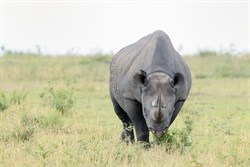
"No matter what side of the trade debate we're on, what we all want is for the poaching to stop," said Allison Thomson, director of OSCAP. "We'll have to agree to disagree on the trade issue, but make no mistake, we're serious about working hard, both domestically and internationally, to put a stop to any proposals to legalise rhino horn trade."
"We need to learn lessons from the ivory trade debacle," said Mary Rice of the Environmental Investigation Agency. "You don't legalise a high-value product like ivory and put it in the hands of hundreds of millions of people and then wonder why elephant poaching has gone off the charts. The same is true for rhino horn."
Susie Watts, speaking for Humane Society International, pointed out to delegates that South Africa's plan to sell its rhino horn at a low price in order to undercut the illegal market would backfire. "The very people who are currently orchestrating the poaching of your rhinos will be the eventual beneficiaries of this plan," she said, warning that the horn traders would buy the horn cheaply from South Africa and then sell it at an inflated price to consumers.
Peter Knights of WildAid showed delegates a number of videos featuring celebrities such as Yao Ming and Jackie Chan. WildAid's video messages have been seen by hundreds of millions of Chinese people and have resulted in a steep decline in the shark fin trade. "We're now working to do the same for rhinos and elephants," said Knights. WildAid's new public statement announcements on rhinos is now being shown widely in Vietnam.
Will Travers of the Born Free Foundation said "We must end speculation about a future legal trade in rhino horn. The South African government should take all such thoughts off the table so that we can focus on working together towards the long-term conservation of rhinos."
Alex Kennaugh of the Natural Resources Defense Council said South Africa wants to get into the rhino horn racket. "Not only will they have to compete against global organised crime syndicates, but a legal trade will also make the cost of doing business cheaper for the criminals, make rangers' jobs harder, make law enforcement harder, and it's not going to make a dent in demand. In fact, a legal trade might even stimulate demand which just means more dead rhinos."
Duong Viet Hong, representing the Wildlife Conservation Society in Vietnam, reported that the Vietnam government had shown strong commitment to fight rhino crime in the last 12 months, but that there were not sufficient controls in place in Vietnam to deal with legal rhino horn trade. She also warned of the dangers of sending mixed messages. "Vietnamese consumers, particularly the youth, are starting to get the message about rhinos. Now is not the time to confuse them by selling rhino horn on the legal market."